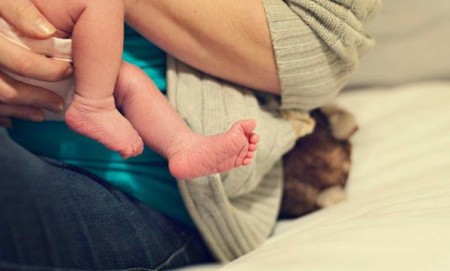I remember the decision making process we began after the adoption of our first child. We wanted to expand our family and give our son a sibling. For us it was a complicated process of examining our options (fertility treatments or future adoption plans) with the full knowledge that either option could take months or years to bear fruit. There was anxiety in that decision making process as we tried to pick the right road, but also an anxiety about our ability to love another child.
When we adopted Josh, we felt incredibly blessed. Our love for him was instant and deep. It was hard to imagine we could possibly love another child even a fraction as much as we loved him. Would we connect with them in the same way? Would having another child somehow lessen our love for Josh?

All photos by Rebecca Tredway Photography
As any mother of more than one child can tell you, we soon learned that loving another child does not mean you have less love to give. When our second son was placed in our arms as our tiny foster baby, we loved him. That love grew over the 17 months it took for him to find permanency and adoption in our family. And with each addition of another child to our home, we have seen that love grows more love. We connect in different ways with each child and learn new ways to experience and express love as we nurture their souls and discover their personalities. We always seem to have more love to give away as we invest more in each child.
Love is not divided. Love is multiplied.
 I have learned this lesson all over again with the addition of a new foster child to our family. She is a temporary presence in our life, but I love her in ways that feel very permanent. And loving her has not meant less love for my other children. Loving her has taught me some important lessons. I have learned to live in the moment. I can’t dream about her future or wait until tomorrow to smoother her with kisses. I need to seize each moment with her because we aren’t promised a tomorrow together. I have learned my older kids are capable of delaying their needs for the needs of another. They have learned to sacrifice and share in new ways as loving this child has grown their hearts, too. And loving her has meant dealing head-on with our consumerist mentality even when it comes to our children—we only want to love what we can “own” and keep.
I have learned this lesson all over again with the addition of a new foster child to our family. She is a temporary presence in our life, but I love her in ways that feel very permanent. And loving her has not meant less love for my other children. Loving her has taught me some important lessons. I have learned to live in the moment. I can’t dream about her future or wait until tomorrow to smoother her with kisses. I need to seize each moment with her because we aren’t promised a tomorrow together. I have learned my older kids are capable of delaying their needs for the needs of another. They have learned to sacrifice and share in new ways as loving this child has grown their hearts, too. And loving her has meant dealing head-on with our consumerist mentality even when it comes to our children—we only want to love what we can “own” and keep.
When I talk to people about being a foster mom, I feel their resistance to loving one of these temporary kids. While we know the truth that as we add more children to our family our love isn’t divided, we have a hard time imagining sharing the love of our family with someone else’s child. If we’re honest, we may even feel that love would be wasted. When we open ourselves up to love, we open ourselves up to pain. This is always true, but that pain feels more like a forgone conclusion when we sign up to love a temporary child. Like pulling our hand away from a hot stovetop, we recoil from that pain even though we know it is good to love.
Which is why the emotions of love aren’t enough.
 As we experience in marriage, love is a commitment. It isn’t always about what feels good or easy. It perseveres, hopes, and trusts even when times are hard. Especially when times are hard. That’s when the emotions run out and foster mom love looks like changing diapers and sleepless nights and going to meetings and dealing with unpredictable court decisions and teaching someone to eat their broccoli who has never seen a green vegetable before. It short, it looks like being the hands and feet of Jesus to a hurting child, a family in crisis, a broken system.
As we experience in marriage, love is a commitment. It isn’t always about what feels good or easy. It perseveres, hopes, and trusts even when times are hard. Especially when times are hard. That’s when the emotions run out and foster mom love looks like changing diapers and sleepless nights and going to meetings and dealing with unpredictable court decisions and teaching someone to eat their broccoli who has never seen a green vegetable before. It short, it looks like being the hands and feet of Jesus to a hurting child, a family in crisis, a broken system.
Foster moms aren’t magical. We don’t have unbreakable hearts or a different kind of love that protects us from pain. We love and grieve and then love again. We do it because we know that love is not divided. Love is not wasted. Love doesn’t collect interest when you put it away and save it for later.
To put it another way:
If I speak the legalese of lawyers and caseworkers, but have not love, my words don’t mean much. And if I understand “the system” and make friends with the right people and am a great advocate and diplomat, but have not love, I am nothing. If I drive myself to exhaustion and sacrifice everything for my foster child, but have not love, I gain nothing.
 Love waits through the lengthy court process. Love doesn’t try to prove you’re the better parent or manipulate for your own good. It doesn’t insist on things happening on its timetable. It is not irritable when visitation schedules change or resentful when goals aren’t met. It does not rejoice when Mom is arrested or tests positive for cocaine or fails to show up for a visit, but rejoices when progress is made and family connections are built. The love of a foster mom bears all things, believes all things, hopes all things, endures all things.
Love waits through the lengthy court process. Love doesn’t try to prove you’re the better parent or manipulate for your own good. It doesn’t insist on things happening on its timetable. It is not irritable when visitation schedules change or resentful when goals aren’t met. It does not rejoice when Mom is arrested or tests positive for cocaine or fails to show up for a visit, but rejoices when progress is made and family connections are built. The love of a foster mom bears all things, believes all things, hopes all things, endures all things.
The love for your foster child never ends.

4 Comments
Leave a reply →